Essential AP Courses & Exams Guide for Student Success
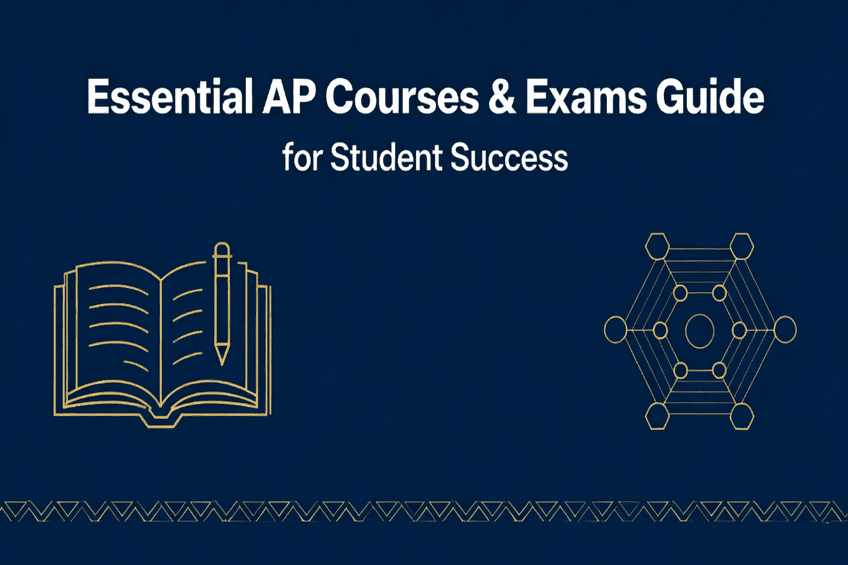
Advanced Placement (AP) is a program created by the College Board in the United States that offers college-level curricula and examinations to high school students. Established in the 1950s, the AP program was designed to provide motivated students with opportunities to experience rigorous coursework before entering college. Schools across the country and internationally now offer AP courses in a wide range of subjects, and students can demonstrate their mastery by taking standardized AP exams each May. Many universities use these scores to award credit or placement, making AP both an academic challenge and a practical pathway to higher education.
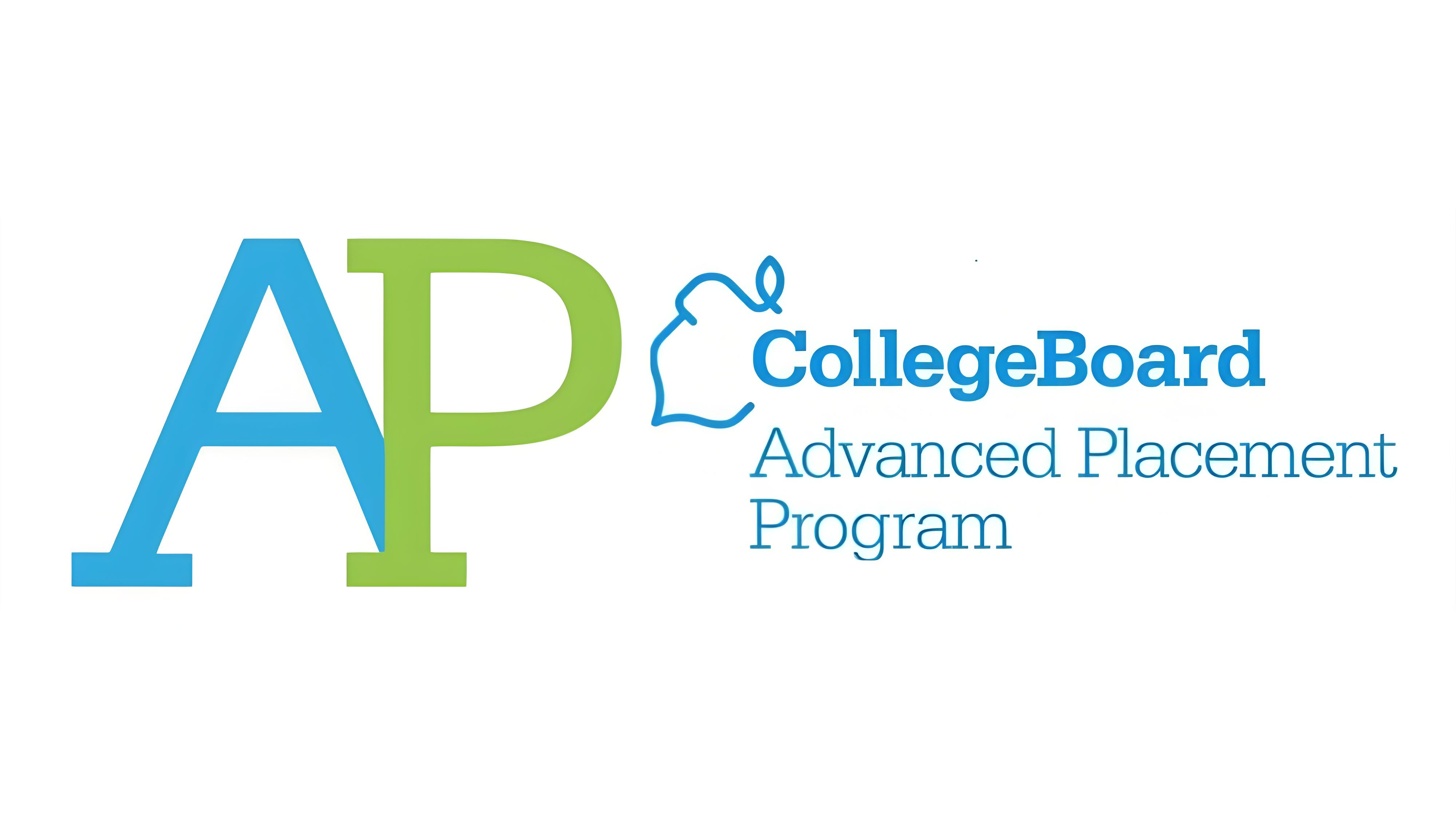
AP Courses vs AP Exams: What Students Should Know
AP courses and AP exams are closely connected but serve different purposes.
An AP course is a high school class that follows a curriculum created by the College Board, taught over an entire academic year. These classes are intended to mirror the pace and depth of an introductory college course, and grades from them count toward a student's GPA and transcript.

By contrast, AP exams are standardized tests offered once a year, usually in May. Each exam is written and administered by the College Board to ensure consistency nationwide. The format generally combines multiple-choice and free-response sections, and results are reported on a 1–5 scale, with 5 indicating the highest level of mastery.

The two components complement each other: AP courses provide day-to-day instruction and practice, while AP exams verify learning under uniform conditions. Colleges and universities use exam scores to decide whether to grant credit, advanced placement, or admissions advantages. In other words, courses help students learn the material, and exams give them a chance to prove it on a national stage.
How Many AP Subjects Are There?
The College Board currently offers 38 AP subjects across several academic areas. These include mathematics and science (such as AP Calculus, AP Biology, and AP Chemistry), history and social sciences (like AP U.S. History and AP Psychology), world languages and cultures (including AP Spanish and AP Chinese), and arts (such as AP Art History and AP Music Theory).
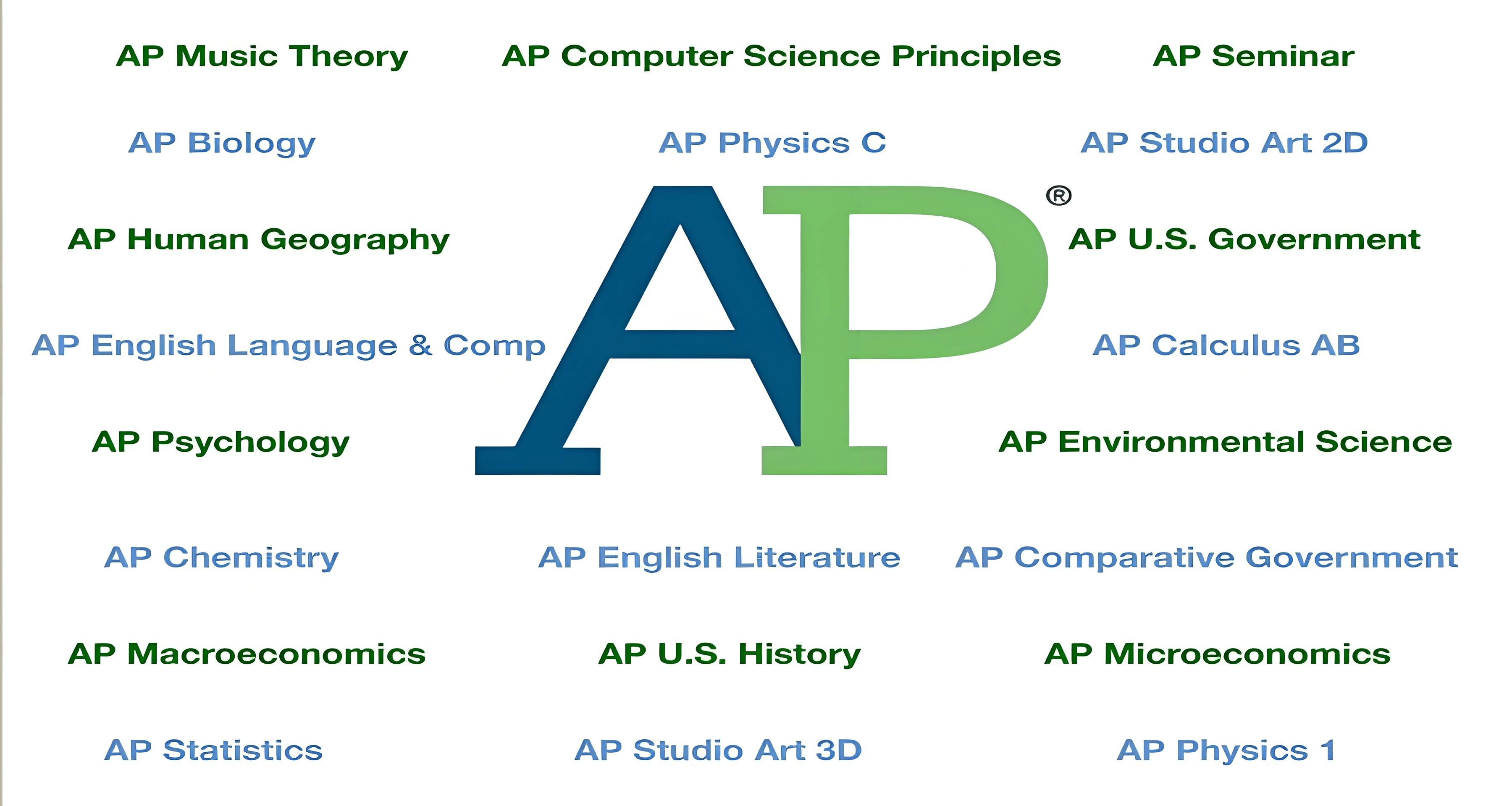
This broad catalog allows students to tailor their high school experience. Some select AP subjects that connect directly to their intended college majors—for example, future engineers might take AP Physics or AP Calculus—while others focus on subjects that showcase academic versatility and strengthen applications. Because of the variety, students can design a schedule that balances personal interest with strategic preparation for college.
AP Exam Timing, Scoring, and Benefits
AP exams are held every May and usually last between two to three hours. Each exam combines multiple-choice questions with free-response sections that test analytical and writing skills. Scores are reported on a scale of 1 to 5:
- 5: Extremely well-qualified
- 4: Well-qualified
- 3: Qualified
- 2: Possibly qualified
- 1: No recommendation
While a 3 is often considered a passing score, many selective universities prefer a 4 or 5 for granting credit or placement. These scores matter because they serve as standardized evidence of college readiness and can directly influence academic opportunities after high school.
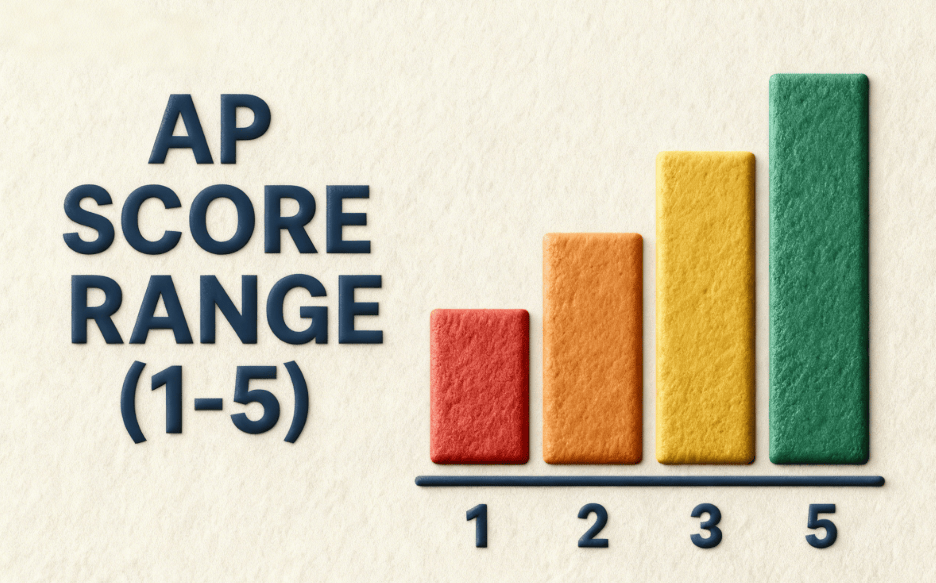
High AP exam scores can unlock several advantages. Many colleges award credit that allows students to skip introductory courses, which in turn saves time and money. For example, a strong score in AP Calculus might allow a student to begin with higher-level math in college, while AP Biology could eliminate the need for an introductory science class. Accumulating multiple credits can even lead to early graduation, reducing tuition costs by a semester or more. Beyond financial benefits, good scores also signal academic commitment and can strengthen a college application by demonstrating mastery of rigorous material.
Because each college sets its own AP credit policy, students should research carefully before selecting their AP courses and exams. By aligning exam choices with their intended major or target universities, students can ensure their effort translates into tangible results such as credit, placement, and admissions advantages.
Popular, Hardest, and Choosing AP Courses
When exploring AP subjects, students often notice clear trends. Some courses, such as AP English Language, AP U.S. History, and AP Calculus AB, are consistently among the most popular. Their wide enrollment means abundant study resources, peer support, and experienced teachers, which can make the learning process more manageable.
At the same time, many students ask: What's the hardest AP subject? Historically, AP Physics C, AP Chemistry, and AP English Literature rank among the most demanding. These subjects combine deep conceptual learning with challenging exams, requiring strong analytical skills and consistent practice. While difficulty should not scare students away, it is a key factor to consider when planning a schedule.
Knowing which AP subjects are popular or challenging is only the first step. The real decision is how to choose AP courses strategically. A future engineer might benefit from AP Calculus and AP Physics, while a student aiming for law or the humanities could focus on AP English Language and AP U.S. History. Balance is critical: most sophomores start with one or two AP courses, while juniors and seniors may handle three to four depending on their academic strengths and extracurricular commitments.
A smart approach often mixes one or two rigorous courses with more accessible options, such as AP Psychology or AP Environmental Science. This balance helps students challenge themselves without risking burnout. Overloading on difficult AP classes can lead to stress and weaker performance, while taking too few may leave a transcript less competitive. The best path is to select AP subjects that reflect both personal passion and practical workload, ensuring growth while supporting long-term goals.
Registration, Costs, and Policies for AP Exams
AP exam registration typically happens through high schools each fall, with most deadlines falling in October or November. Students sign up with their AP coordinator rather than directly with the College Board.
The standard exam fee in the U.S. is $97 per exam (and slightly higher for exams taken outside the country). However, fee reductions are available. According to the College Board's official policy, students from low-income families who qualify for the federal Free or Reduced-Price Lunch program, or who receive other forms of public assistance, may be eligible for a $35 College Board reduction. Many states and school districts also provide additional subsidies, which can lower the cost even further—sometimes to under $20 per exam.

On exam day, students must follow strict procedures: bring a valid photo ID, have only approved materials (such as College Board–authorized calculators for math or science exams), and adhere to rules regarding timing, breaks, and prohibited items. Being familiar with these logistics early not only reduces stress but also ensures compliance with testing security standards.
Understanding registration timelines, costs, and policies allows students to plan ahead financially and academically, ensuring that access to AP exams remains equitable for all backgrounds.
Study Resources and Preparation for AP Exams
Effective preparation is essential for success on AP exams. Students have access to a wide range of study tools, from commercial review books to free digital resources. One of the most reliable sources is the College Board's AP Classroom, which offers unit guides, topic questions, and personal progress checks aligned directly with the exam framework. Additionally, the College Board provides released free-response questions from past years, which help students understand scoring expectations and practice real exam formats.
Beyond official materials, many learners benefit from structured review books (such as those by Princeton Review or Crack's) and interactive online platforms like Khan Academy, which partners with the College Board to provide free instructional videos and practice exercises, especially for AP math and science subjects.
For students who self-study AP subjects without enrolling in an official class, discipline and reliable resources are critical. Combining official practice exams, online lectures, and consistent study schedules can bridge the gap. Independent learners should also consult their AP coordinators about exam registration and requirements to avoid logistical surprises.
Preparation is not just about memorization—it's about practicing skills under exam-like conditions and using trusted resources to track progress effectively.
Practical Tips for Studying AP Courses and Exams
- Start Early – Begin reviewing well before May. Treat your AP course as year-round preparation instead of cramming at the end.
- Use a Study Calendar – Break down topics into weekly goals. Mixing practice questions with reading helps reinforce memory.
- Practice with Timed Tests – Simulate exam conditions using College Board's released materials. Time management is often as important as content knowledge.
- Form Study Groups – Explaining concepts to peers strengthens your own understanding and keeps motivation high.
- Ask Teachers for Guidance – AP teachers often know which topics are emphasized and can clarify tricky points.
- Balance with Other Commitments – Avoid overloading on AP courses. Quality preparation for fewer subjects is better than spreading yourself too thin.
- Use Smart Study Tools – For math and science AP subjects, a reliable math solver tool can check your steps, provide alternate solutions, and highlight where mistakes occur. Used wisely, it supports learning rather than replacing it.
These habits not only make AP coursework manageable but also build the resilience and study discipline that carry over into college-level academics.
Comparing Programs and Exam Options
AP vs IB Programs
Both AP and International Baccalaureate (IB) offer advanced high school curricula, but they take different approaches. AP emphasizes individual subject mastery, allowing students to focus on specific areas of interest, while IB promotes interdisciplinary learning, integrating multiple subjects through core requirements like the Theory of Knowledge and the Extended Essay. Students should consider their learning style, workload preferences, and long-term academic goals when deciding between the two programs. For example, self-motivated learners with a clear subject focus may prefer AP, whereas those seeking a broad, globally-oriented education might find IB more suitable.
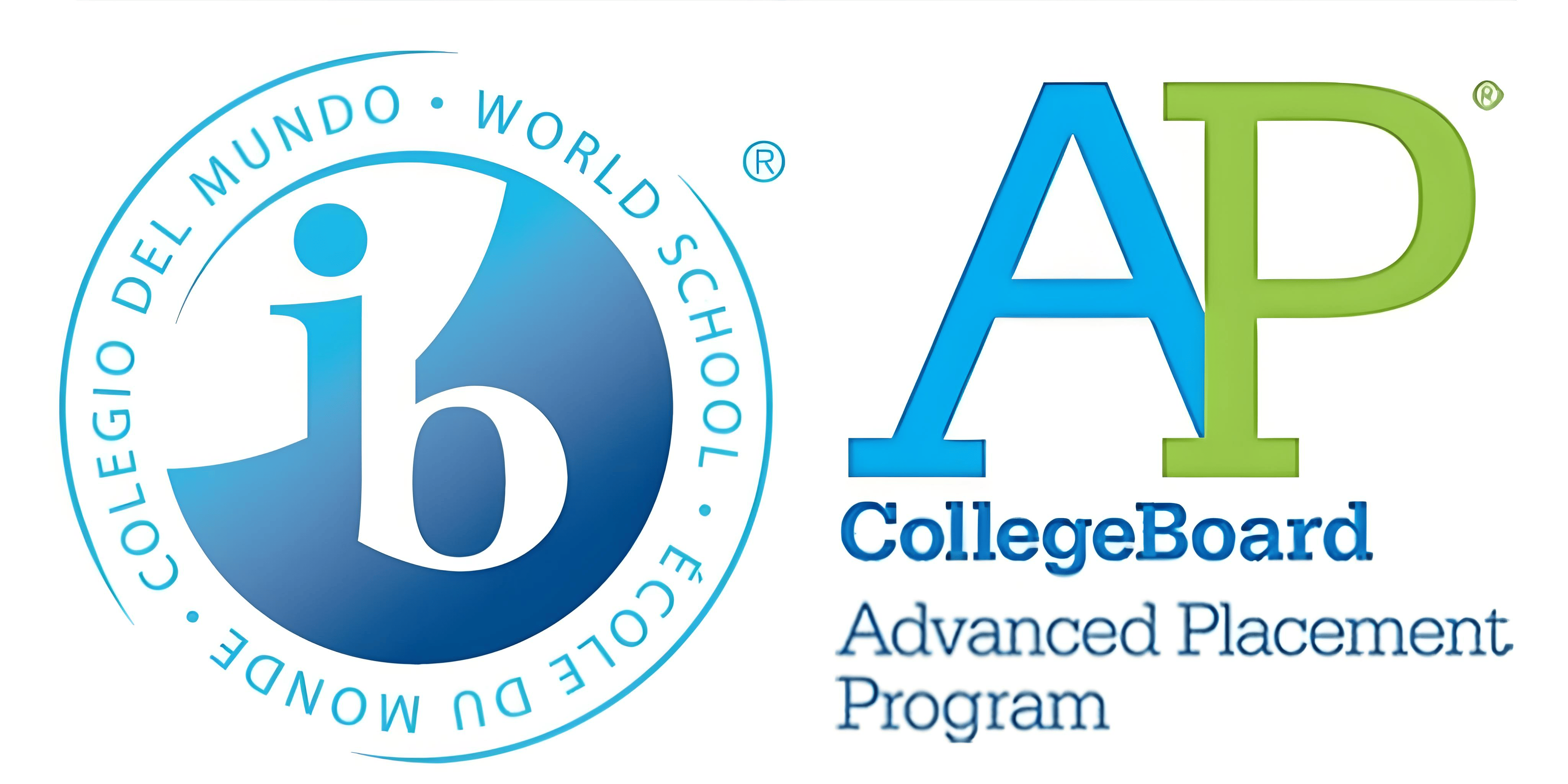
Self-Studying for AP Exams
Some students choose to self-study AP exams, particularly when their school does not offer certain courses. This approach works best for disciplined learners who can structure their study schedules, access reliable materials (such as College Board practice exams), and regularly track progress. Self-studying can be challenging, but it allows flexibility in pacing and the opportunity to focus on personal strengths and weaknesses.
Online and Remote AP Exams
During the COVID-19 pandemic, AP exams temporarily moved online to accommodate remote learning. The College Board has since returned to in-person testing, emphasizing standardized conditions and exam security. While online exams are currently rare, students should stay informed about College Board policies, as exceptions or accommodations (such as for health or accessibility reasons) may still apply.
Conclusion
AP courses provide structured classroom learning, while AP exams offer standardized evaluation of mastery across subjects. Together, they can boost college applications, earn credit, and strengthen academic skills. By choosing courses wisely, planning strategically, and using reliable study resources, students can make the most of the AP program and set themselves up for future success.
FAQ
1. What is the difference between AP courses and AP exams?
AP courses are high school classes designed by the College Board to mimic college-level study, typically lasting an entire academic year and counting toward GPA. AP exams are standardized tests offered annually in May, assessing students' mastery of a subject on a 1–5 scale. Courses provide instruction and practice, while exams demonstrate knowledge under uniform conditions.
2. How are AP exams scored?
AP exam scores range from 1 to 5:
- 5 – Extremely well-qualified
- 4 – Well-qualified
- 3 – Qualified
- 2 – Possibly qualified
- 1 – No recommendation
Many universities award credit or placement for scores of 3 or higher, though selective schools may require a 4 or 5.
3. How should I prepare for AP exams?
Effective preparation strategies include:
- Using College Board AP Classroom resources and daily AP videos.
- Practicing with released free-response questions from past exams.
- Creating a study calendar and consistent review schedule.
- Forming study groups and discussing challenging concepts.
- Simulating exam conditions to practice time management.
4. How much do AP exams cost?
In the U.S., each AP exam costs approximately $97. Fee reductions are available for eligible low-income students (usually $37), and some states or districts may provide additional subsidies. Students should consult their AP coordinator for eligibility and application details.
5. Which AP subjects are most popular or most challenging?
- Popular subjects: AP English Language, AP U.S. History, AP Calculus AB – these courses often have more study resources and peer support.
- Challenging subjects: AP Physics C, AP Chemistry, AP English Literature – these require deep conceptual understanding and strong analytical skills.
When choosing AP subjects, consider both personal interest and academic goals.
Recent Posts

Stuck on a calculus problem at 10 PM? Frustrated by math tools that only give you answers—without explaining how to get ...Try it free now

Whether you're new to GoMim or have been using it for a while, you may not have fully explored everything it can do. GoM...Try it free now

Imagine simply snapping a photo—or typing a problem—and getting a clear, step-by-step breakdown of how to solve it. Toda...Try it free now

In 2025, the field of mathematics education and problem-solving is being reshaped by the rise of AI math solvers. From s...Try it free now

In July 2025, artificial intelligence achieved a landmark moment: Google DeepMind's Gemini Deep Think and an advanced ex...Try it free now

Let's face it — homework can be tough, especially when it comes to subjects like algebra, calculus, or trigonometry. Tha...Try it free now
Table of Contents
- AP Courses vs AP Exams: What Students Should Know
- How Many AP Subjects Are There?
- AP Exam Timing, Scoring, and Benefits
- Popular, Hardest, and Choosing AP Courses
- Registration, Costs, and Policies for AP Exams
- Study Resources and Preparation for AP Exams
- Practical Tips for Studying AP Courses and Exams
- Comparing Programs and Exam Options
- Conclusion
- FAQ
Your Personal AI Math Tutor
instant problem-solving, step-by-step explanations, personalized learning paths, and visual aids
AI Math SolverLearn math smarter on GoMim
Try GoMim Free - The Most Advanced AI Math Solver!
Join thousands of students using GoMim for math learning and problem -solving.
